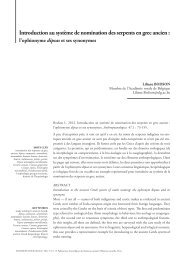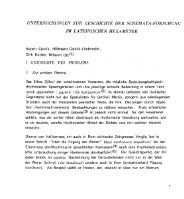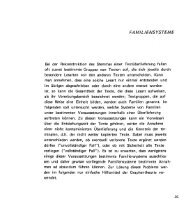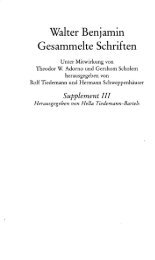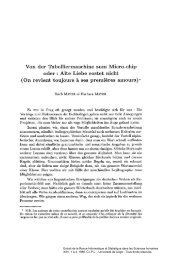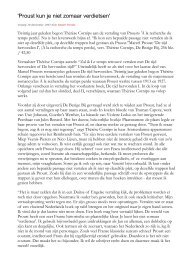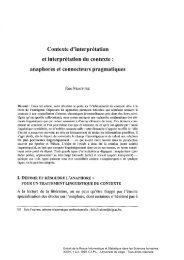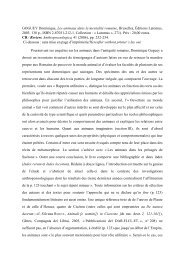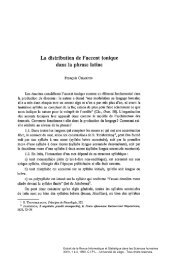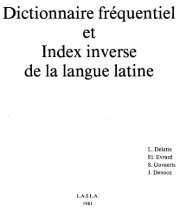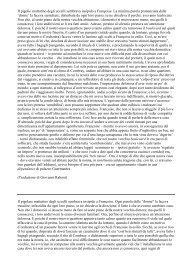The Lessico Intellettuale Europeo and its Activities - Université de ...
The Lessico Intellettuale Europeo and its Activities - Université de ...
The Lessico Intellettuale Europeo and its Activities - Université de ...
Create successful ePaper yourself
Turn your PDF publications into a flip-book with our unique Google optimized e-Paper software.
THE LESSICO INTELLETTIJALE EUROPEO AND ITS AcnVITlES 235<br />
of a <strong>Lessico</strong> of this kind. Works Iike this enable the rea<strong>de</strong>r to access the<br />
author's language directly <strong>and</strong> synoptically grasp-as in the case of Bacon <strong>and</strong><br />
his NOVI/Ill orgalll/lIl, opposed, as the title suggests, to the old, Aristotelian<br />
OrgmlOll-the enrichment <strong>and</strong> transformation of the philosophico-scientific<br />
dictionary at the beginning of the seventeenth century.<br />
A lexicon of the Paragrallll11l 1 Paracelsus's most successful <strong>and</strong> significant<br />
philosophical work, is scheduled to be published by the LIE during the course<br />
of this year: the volume will be compiled by M.L. Bianchi who has already<br />
published the in<strong>de</strong>xes. 42 <strong>The</strong> latter provi<strong>de</strong> the rea<strong>de</strong>r with a kind of "Ariadne's<br />
thread", which is indispensable for finding one's way through the <strong>de</strong>nse forest<br />
of Paracelsian vocabulary, which is particularly bristling with difficulties <strong>and</strong><br />
lexical "novelties".<br />
While the vocabulary of Paracelsus <strong>and</strong> Bacon documents the profoundly<br />
innovative range of their thought, an equally radical transformation is to be<br />
found in philosophicallanguage at the beginning of the German Enlightenmenl.<br />
<strong>The</strong> <strong>Lessico</strong> ftlosoftco <strong>de</strong>lla Friiaufkliinlllg,43 edited by Dagmar von Wille,<br />
is evi<strong>de</strong>nce of the vitality <strong>and</strong> the use of Latin in sorne works by Christian<br />
Thomasius, Christian Wolff <strong>and</strong> Johann Georg Walch, at the beginning of that<br />
heated <strong>de</strong>bate which was to lead to the adoption of serlllo vl/Igaris in scientific<br />
disciplines. As is well-known, Thomasius was the first to give university lectures<br />
in German, thus claiming the need to transfer into his MI/tler-Sprache that<br />
intellectual legacy that had until then been expressed exclusively in Latin.<br />
<strong>The</strong> <strong>Lessico</strong> perm<strong>its</strong> one to observe the transformations that were the first<br />
consequences of that complex <strong>de</strong>bate, the insertions <strong>and</strong> overlappings of the<br />
two languages, the attempts-already anticipated by Leibniz 44 -to conclu<strong>de</strong> a<br />
project for the complete emancipation of the German philosophicallexis.<br />
Kant is an exemplary case in point. He un<strong>de</strong>rlines the need to resort<br />
to the more firmly-established Latin terminology even in German texts when<br />
specific Kl/llsMorter cannot be found in the national idiom. In fact the great<br />
period of philosophical <strong>and</strong> scientific Latin prose cornes to a close with Kant:<br />
with the adoption of the vemacular, Latin lost <strong>its</strong> function as the vehicle of<br />
expression common to ail intellectuals <strong>and</strong> became exclusively relegated to<br />
42 Cf. PubblicazioJli, no. 47.<br />
43 Cf. PubblicazioJli, no. 54.<br />
44 E. eanOlle edited the ill<strong>de</strong>x Jocorum of the Ermahmmg ail die Telllsche, the text in which<br />
Leibniz hoped for "the foundation of a company which, sponsored by a noble patron, would<br />
publish a series of fundamental works written in German" (Lexicoll phiJosophic/l11l, 4-1989, p. 3).<br />
Regarding the Leibniz lexicon, LIE is currently compiling a "contrastive" concordance of the Latin,<br />
German <strong>and</strong> French versions of the MOlladologia, edited by Lamarra, Pimpinella <strong>and</strong> Tagnon.<br />
Extrait <strong>de</strong> la Revue Informatique et Statistique dans les Sciences humaines<br />
XXX, 1 à 4, 1994. C.I.P.L. - <strong>Université</strong> <strong>de</strong> Liège - Tous dro<strong>its</strong> réservés.



